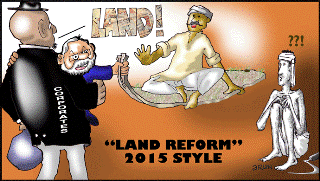The Test of India’s Land Bill

The Indian government of Prime Minister Narendra Modi has re-promulgated a controversial land ordinance for the third time. The much-contested Land Acquisition Bill is has arisen as a major ideological contest for the new administration. The current Bill seeks to amend the 2013 law passed under the United Progressive Alliance-dominated government. The current government led by the Bharatiya Janata Party (Indian People’s Party, or BJP) is expected to table the new Bill in a joint session of parliament when it lapses in June 2015. However, a coalition of political parties and a groundswell of farmer protests have declared their opposition to the Bill, citing its pro-rich bias as an example of the process of “accumulation by dispossession” across the country.
The Bill effectively would complete the privatization of the public sphere, not least to the advantage of external investors; however, that trend is anything but new. The current iteration follows the events involving state-sponsored violence at Nandigram in 2007, the unconstitutional 2009 acquisition of 1,400 acres of farmland in eight villages around Gurgaon, and the infamous POSCO steel plant acquisitions in Odisha, among other examples.
The dominant land-management pattern has turned large tracts of land into corporate possessions, often in exchange for a pittance and backed by the punitive powers of the state police. Dispossessed villagers, farmers and indigenous communities continue to battle furiously against the encroaching “legality” of “eminent domain” claims by the state against the land-dependent people.
The Land Bill’s current draft would annul the required social-impact assessment and the 80% of the local community approval before such acquisitions. The Bill would have acquired land prices set by dominant market actors such as insurance companies, which apply internal valuation criteria, alien to the owners’ use value, to set official costs of acquired land. Land acquisition during drought and flood, as is currently the case, would enable distress sales that further dispossess tenure holders, especially smallholders.
On 23 April 2015, a farmer hanged himself at a protest rally in India`s capital demonstrating against the current government`s intended reform of the land-acquisition laws. From 2006 to 2014, nearly 200 farmers across India have committed suicide, owing to land loss and crop-related distress. Meanwhile, insurance companies have intensified their acquisitions of farmer-held lands in Vidharba, which case epitomizes the national land-tenure dynamic.
Even if the Bill current were defeated, the market-led land-acquisition opponents remain steadfast. For many, it is a matter of survival. The current battle is just one in a long, ongoing struggle to preserve the people’s land.
|